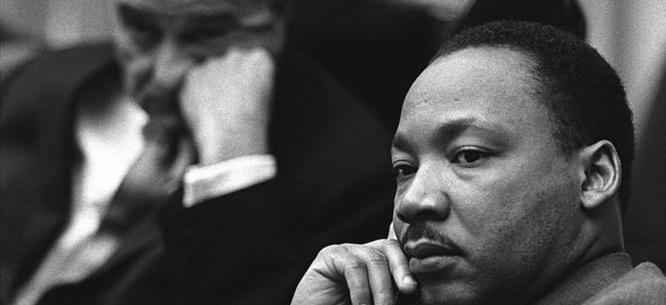King and Johnson After Selma
King and Johnson After Selma

The success of Ava DuVernay’s Oscar-nominated film Selma has created the impression that the Selma-to-Montgomery voting rights march was the defining civil rights story of 1965. As a result, we haven’t paid the attention we should to the event with which Selma must be paired—the six-day Watts riots, which began in August 1965.
The Watts riots changed the direction of the civil rights movement just as it was peaking and just as President Johnson and Martin Luther King, Jr. were developing a new closeness in their working relationship. The riots, which took their name from the predominantly black Los Angeles neighborhood in which they centered, occurred five days after President Johnson, with King among the dignitaries present, signed the Voting Rights Act into law. One day before the riots, the Senate had confirmed Johnson’s nomination of future Supreme Court justice Thurgood Marshall as solicitor general (he was the first black jurist to hold either position).
The Watts riots did not begin out of the blue. In 1964 there were urban riots in New York, Philadelphia, and Chicago, and by 1965 Watts was primed to explode. Four times as many people per square block lived in Watts as in the rest of Los Angeles; 30 percent of the black men living there were unemployed; and tension between the police and the residents of Watts had been high for years. Of the 205 police officers assigned to Watts, 200 were white.
For King and the president, who had helped make 1965 such a triumphal year in civil rights, the Watts riots came at the worst possible time. The riots undercut the political momentum created by Selma and set in motion a white backlash that would last for years and, in 1968, help propel Richard Nixon to the presidency.
The riots began on Wednesday, August 11, after a California Highway Patrol officer pulled over a black motorist, Marquette Frye, for apparent drunk driving. (Frye had been out drinking with his brother, who was celebrating his discharge from the Air Force.) When Marquette Frye resisted arrest, a confrontation ensued in which both brothers and their mother, who had rushed to the scene from her nearby home, were taken away in a squad car.
A crowd, which eventually swelled to 1,500, began taunting the police, and what should have been a routine traffic stop quickly became a violent confrontation. Before the night was over, the police made twenty-nine arrests, and one of the worst riots in American history was under way. By Thursday the rioting had spread to other Los Angeles neighborhoods, and on Friday, when the national guard was called in, it was unable to stop the looting or the arson going on.
On August 16, when 14,000 national guardsmen and 1,500 local officers finally quelled the unrest, thirty-four people were dead (at least twenty-three of them at the hands of the authorities), over 3,500 had been arrested, and the estimated damages totaled $40 million. Johnson and King, realizing the dimensions of the problem they faced so soon after Selma, wasted no time getting involved, but their efforts were of no avail. Johnson’s plea on the fourth day of the riots for “every person in a position of leadership to make every effort to restore order in Los Angeles” produced few results, as did King’s meeting on August 17 with Watts residents and on August 18 with a hostile Los Angeles mayor and police chief.
When King and Johnson spoke by telephone on August 20, they agreed that Watts had changed the political atmosphere in the country. They also believed that the conditions in which the residents of Watts were forced to live had played a key role in causing them to take to the streets.
“I’m fearful that if something isn’t done to give a new sense of hope to people in that area, full-scale race war can develop,” King told the president. Johnson, who assured King that federal agencies were preparing a multimillion-dollar aid package for Los Angeles, took a similar view of the dangers ahead. “There’s no use giving lectures on the law,” the president observed, when people have “no roof over their head, no job to go to.”
The phone call constitutes a high water mark in Johnson’s and King’s relationship. As the full transcript of their call makes clear, Selma had led them to become more trusting of each other. They talked as if they expected to be allies for years to come. They even joked with each other. The conversation ended with a laugh from King after the president told him, “I’m just as close as a telephone if you’ve got enough money to pay for it; if you haven’t, why, call collect.”
One of the casualties of Watts is that the closeness King and the president had established never went further. They were unable to reverse the shift in white public opinion that the riots had caused. The pictures of burned-out buildings and the media’s emphasis on mobs shouting, “Burn, Baby, Burn,” were too much to overcome, and after 1965 the escalating war in Vietnam drove a wedge between King and Johnson that became permanent when, in the spring of 1967, King publicly denounced the war in a much-publicized speech at Riverside Church in New York City.
Nicolaus Mills is professor of American studies at Sarah Lawrence College and author of Like a Holy Crusade: Mississippi 1964—The Turning of the Civil Rights Movement in America.




